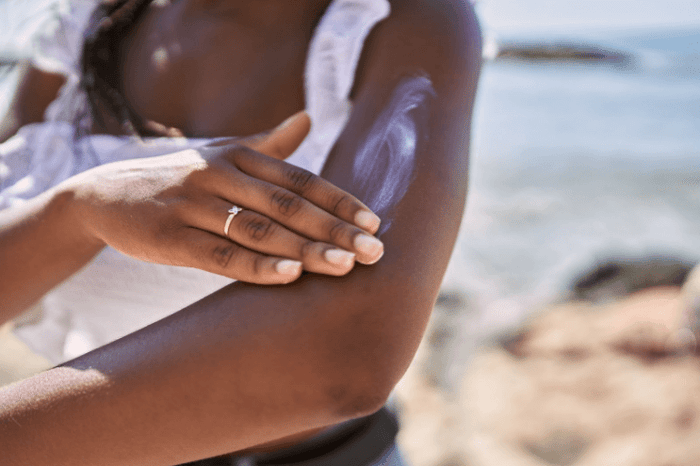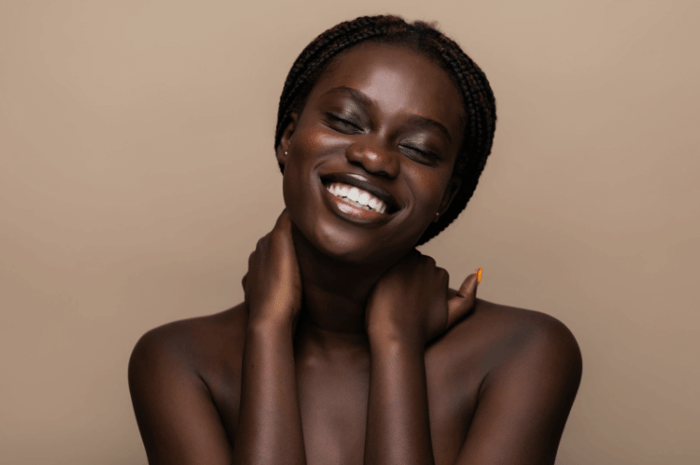Do you have dark skin, and have you ever wondered ‘how does melanin protect the skin from sun damage and other environmental concerns?’ Then, this is the guide for you.
We'll uncover why melanin-rich skin tones have a shield protecting against skin damage and discolouration.
So, if you'd like to know more about how higher concentrations of melanin can play a vital role in sun exposure protection and which Ava Estell product works to keep your complexion glowing and healthy, read through our guide.
[Disclaimer: This guide will discuss how melanin can protect the skin against harmful ultraviolet rays from the sun and other factors. Although darker skin tones have a better chance of protection than lighter complexions, this isn't the only way to be safe against risks. So, keep in mind your skin type and how you should protect it beforehand.]
The Protective Role of Melanin
What is melanin, and how does it protect the skin? Melanin is the pigment responsible for the colour we find in our eyes, hair, and skin. The higher the concentration in your skin, the darker the skin tone is.
There are a couple of main functions of melanin production in human skin, especially in dark-skinned individuals we highlighted below:
Shielding Against UV Radiation
The production of melanin in Black skin is reliable at helping reduce the harmful impact UV rays have on the skin. This can occur from overexposure to sunlight. It leads to a higher risk of skin cancer, sun spots, or age spots over time.
More melanin can reduce the risk, as it acts as a defence mechanism for the skin cells. However, we should also consider using effective skincare products to protect the skin from long-term sun damage.
We recommend the Ava Estell Summer Body Cream, which has natural zinc oxide to treat skin irritation, heal hyperpigmentation concerns, and promote healthy skin development.
Antioxidant Properties
So, how does melanin protect the skin with antioxidant properties? Thankfully, darker skin's melanin neutralises harmful free radicals known to damage the skin cells. Melanin can reduce the oxidative stress these free radicals cause and keep the skin cells safe and healthy.
Additionally, melanin can protect against environmental concerns, like pollutants. The melanin will bind to these substances and reduce the harm to the outer layer of the skin.
The Health Benefits of Melanin
The melanin pigment helps skin cells fight the risks of UV exposure. We also highlighted some key health benefits that may not be prevalent in light skin tones without external protection. So, how does melanin protect the skin and benefit health?
Lowers Risk of Skin Cancer
Too much UV light can result in a higher cancer risk. Thankfully, types of melanin in dark skin can prevent DNA damage in the outer layers of skin cells and keep them healthy for a prolonged time.
Moreover, melanin can help with the healing time of wounds, hyperpigmentation, and outer skin inflammation from sun damage.
Although an excess amount of melanin can be more of a challenge to rebalance, it's possible to see changes to the skin texture and appearance with a consistent skincare routine and melanin-based skin products in mind.
Delays Signs of Aging
There is a colloquial phrase, "Black don't crack", which suggests dark skin can slow down the signs of wrinkles and age-related spots. This is due to the higher melanin production that isn't as prominent in lighter skin tones.
Black don't crack may apply to every darker-skinned individual. But, the advanced protective properties that you notice in darker complexions help against:
- Harmful sun rays
- Harsh environmental factors
- Keep the skin healthy and nourished
- Give the appearance of younger-looking skin for a longer period
How Melanin Protects The Skin: Closing Thoughts
So, how does melanin protect the skin? Melanin is the pigment in the skin that acts as a natural shield. Environmental concerns and sun and cell damage are some of the top concerns to light and dark-skinned individuals.
So, having a natural layer of protection is an excellent advantage. But, we suggest using products with natural active ingredients like zinc oxide to help combat skin risks even further.
That's where Ava Estell's Summer Body Cream comes in to help renew damaged skin cells. It will also help heal hyperpigmentation and discolouration concerns to provide a renewed and brighter complexion.
If you would like to know more about the ways Ava Estell products can transform your skin and protect it when exposed to UV rays, discover the complete skincare range today.
Frequently Asked Questions
How does melanin protect the skin from damage?
Melanin is produced by melanocyte cells in the skin. They help protect the skin against sun concerns caused by UV rays.
How does melanin protect the cells?
Melanin can protect the cells from the risks of aggressive free radicals that are known to damage and lead to oxidative stress.
What is melanin, and how does it protect the skin?
Melanin is a pigment found in dark skin tones. It acts as a shield against environmental concerns, heals wounds, and keeps the outer skin layer healthy.
How does melanin protect skin DNA?
Melanin acts as a natural sunscreen. It minimises mutations from damaged DNA that can lead to skin cancer.










